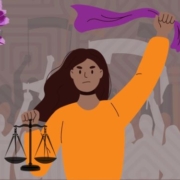With agreement on the opinion, the discussion begins in the Chamber of Deputies
After the plenary meeting of the General Legislation, Criminal Legislation, Social Action and Public Health, and Women and Diversity commissions, an agreement was finally reached on the bill for the Voluntary Interruption of Pregnancy that will be voted on tomorrow at the venue. of the Chamber of Deputies. What modifications does it have with respect to the project that the Executive Power had presented in November? What can we expect from today’s session? We tell you here.
“Below, we offer a google translate version of the original article in Spanish. This translation may not be accurate but serves as a general presentation of the article. For more accurate information, please switch to the Spanish version of the website. In addition, feel free to directly contact in English the person mentioned at the bottom of this article with regards to this topic”.
As planned in the legislative agenda, this Wednesday, December 9, the committee meeting was held to rule on the IVE bill. With 77 votes in favor, 30 rejection and 4 abstentions, an agreement was reached on the text of the project. The same thing had happened hours before in the plenary session of the Budget and Social Action and Public Health committees, which had discussed the First 1000 Days bill. Both projects will be discussed at the venue this Thursday, December 10.
What is the agenda for the day?
The call for the session was set at 11 in the morning, and the order of treatment of the projects will be first that of IVE and then that of Attention and comprehensive health care during pregnancy and early childhood, known as the program of the First 1000 days.
Throughout the day, the Campaign for Legal, Safe and Free Abortion called to accompany the vote in public spaces throughout the country. In Buenos Aires, the vigil will begin at 10 am in the vicinity of Congress, with activities throughout the day and until the law is voted. In Córdoba, the call is in the former Plaza Vélez Sarsfield from 6:00 p.m. As the right to abortion is a matter of public health, and taking care of ourselves as well, we reinforce the recommendations to participate in the vigil:
- We wear a nose mask at all times.
- We wash our hands with alcohol gel.
- We keep the distance of 2 meters.
- We take care of the sun with sunscreen, light clothing and a hat.
- We bring fresh water to stay hydrated.
- We do not respond to anti-rights provocations and we try to always be accompanied and attentive.
As the two bills will be discussed, the session is expected to last several hours. On IVE, a total of 170 deputies would speak, so the vote on the law would be in the early morning hours.
What does the opinion say? What modifications do you propose?
A few weeks ago we published this analysis with a systematization of the bills that would serve as the basis for this debate: the one presented by the Executive Power in November and the one presented by the Campaign in 2019, contrasting with the opinion approved by the Chamber of Deputies in 2018.
Yesterday a new opinion was approved, which foresees some modifications in the project presented by the Executive Power. What are they about?
In Art. 8, which regulates cases where the person requiring the practice is a minor, now a reference is made directly to art. 26 of the CCyC. Before the amendment, it was specified that those between 13 and 16 years of age have sufficient aptitude and maturity to decide on the practice and give due consent, unless a procedure that involves a serious risk to their health or life must be used. The reference to the applicable legal framework for these cases is maintained, as proposed by the Convention on the Rights of the Child and Law No. 26.061 on the Comprehensive Protection of Boys, Girls and Adolescents, which always provides that their best interests are protected and their rights guaranteed. to be heard.
On the other hand, the new Art. 11 is added, which indicates:
CONSCIOUS OBJECTION. OBLIGATIONS OF HEALTH ESTABLISHMENTS. Those health effectors of the Private Subsector or Social Security that do not have professionals to carry out the interruption of pregnancy due to the exercise of the right to conscientious objection in accordance with the previous article, must foresee and order the referral to an effector actually perform the service and that it is of similar characteristics to the person requesting the benefit consulted. In all cases, the practice must be guaranteed in accordance with the provisions of this law. The procedures and costs associated with the referral and the transfer of the patient will be the responsibility of the effector who performs the referral. All referrals contemplated in this article must be billed according to the coverage in favor of the effector performing the practice.
This new article provides a solution for the cases of private health or social security institutions where there is no non-objector professional, indicating that they must arrange the referral to another institution that does carry out the practice, guaranteeing that it is done in accordance with the law , and taking charge of all the procedures and costs associated with the referral and transfer.
At the same time, the wording of Article 10 is maintained, which recognizes the right to conscientious objection, with some limitations, such as that whoever objects must uphold their decision in all areas, public and private, in which they exercise their profession; She must also refer the patient in good faith to be attended by another professional in a temporary and timely manner, without delay; You must adopt all the necessary measures to guarantee access to the practice and finally you must comply with the rest of your professional duties and legal obligations.
It is also prohibited for cases in which the life or health of the pregnant person is in danger and requires immediate and urgent attention, and for cases that require post-abortion health care. This article also provides that non-compliance may give rise to disciplinary, administrative, criminal and civil sanctions, as appropriate.
However, this wording does not contemplate limitations that did arise in the opinion of the Deputies of 2018, such as that the objection had to be previously expressed individually and in writing, and communicated to the highest authority of the health establishment.
Another important point of that opinion is that it obliged the health establishments to keep a record of the professional objectors, having to inform the health authority of their jurisdiction, and explicitly prohibited institutional conscientious objection and / or ideology.
What does the inclusion of articles that admit the assumption of individual conscientious objection, and assumptions of institutions where there is no non-objector professional, mean?
We know that conscientious objection is a legal institute used to obstruct or delay access to sexual and (non) reproductive health services, as we have seen in cases of contraception and legal interruption of pregnancy. Recognizing it within the law, with the legal status of “right”, does nothing other than enable non-compliance with the law itself, seriously jeopardizing its effectiveness.
Conscientious objection is a legal institute that allows certain persons to be exempted from complying with a legal obligation, in cases where the action ordered by the norms contradicts their deepest religious, ethical or moral convictions; provided that this does not cause harm to third parties.
We understand that the incorporation of individual conscientious objection for direct intervention in the practice of IVE is based on respect for this freedom of conscience or religion, as long as it is exceptionally allowed and with all the limits mentioned. But recognizing the claim of private institutions to exempt themselves from the provision of pregnancy termination services is unthinkable. We fear that this may happen in the event that all the health professionals of an institution declare themselves as objectors. Even if it is not the institution that denies the service, if all its professionals are objectors, it becomes a disguised institutional conscientious objection.
A solution of this type violates the freedom and right to health of patients, and increases costs and problems for the public health system, which will be burdened by having to resolve the situations that the private subsystem derives. We are also concerned that as a consequence of this recognition, the situation in Uruguay will be repeated, where high levels of objection are identified, and there are even jurisdictions with 100% professional objectors. This exacerbates the difficulties that affect rural areas or areas far from large cities, where access to health services is more limited and there are fewer public institutions.
The private institutions that provide health services perform essential public functions: the provision of health services to the population. The fact that these functions are carried out for profit and through a private contract does not detract from the nature of the service. Therefore, the social function that these private companies fulfill is different from that of others that are not committed to guaranteeing people’s fundamental rights. In this sense, the social and legal requirement that is made to companies or entities that provide health services is much greater. Not only should they guarantee non-discrimination in access to services, but they are also subject to greater control and surveillance by the State.
In this sense, admitting that an entire institution can be exempted from the provision of IVE services is unjustified and would disproportionately put at risk the access to health of the people associated with them.
In any case, the opinion obliges these establishments to guarantee the referral, in a place with similar characteristics to the one that the person requesting the benefit consulted, where the practice must be guaranteed in accordance with the law. Then it indicates that the procedures and costs associated with the referral and transfer will be the responsibility of the institution that referred, providing that it will always be invoiced in favor of the effector who actually performs the practice.
It will be law
Despite these controversial points, we welcome the approval of the majority opinion and await treatment in both Houses before the end of the year. We recognize that reaching this instance was the result of the struggles of the human rights movement that has been promoting this law for so many years.
The National Congress now has the duty to give the legislative discussion with responsibility that a public health problem of this magnitude deserves, in this new opportunity to enact the law and mark progress in the protection of the rights of women and individuals. pregnant women in our country.
We hope that those who legislate put aside their personal convictions and private morals when tackling this project. They are legislating on our future, on our health and on our lives. We demand that you do so responsibly, supporting this bill with your positive vote, because it is a bill that expands rights and saves lives.
This afternoon, we go for the half penalty. And before the end of 2020, for the conquest of the right to legal, safe and free abortion.






